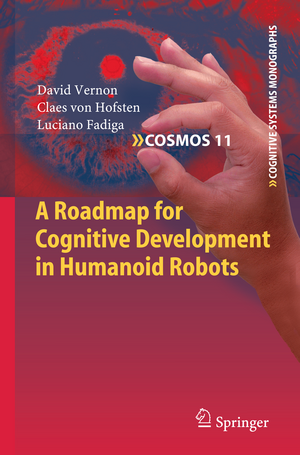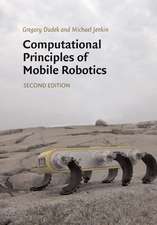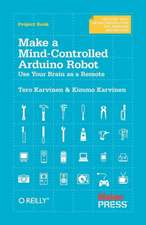A Roadmap for Cognitive Development in Humanoid Robots: Cognitive Systems Monographs, cartea 11
Autor David Vernon, Claes von Hofsten, Luciano Fadigaen Limba Engleză Hardback – 4 noi 2010
| Toate formatele și edițiile | Preț | Express |
|---|---|---|
| Paperback (1) | 637.78 lei 6-8 săpt. | |
| Springer Berlin, Heidelberg – 14 oct 2014 | 637.78 lei 6-8 săpt. | |
| Hardback (1) | 643.99 lei 6-8 săpt. | |
| Springer Berlin, Heidelberg – 4 noi 2010 | 643.99 lei 6-8 săpt. |
Din seria Cognitive Systems Monographs
- 15%
 Preț: 647.59 lei
Preț: 647.59 lei - 20%
 Preț: 645.31 lei
Preț: 645.31 lei - 18%
 Preț: 957.62 lei
Preț: 957.62 lei - 15%
 Preț: 632.55 lei
Preț: 632.55 lei - 20%
 Preț: 1447.17 lei
Preț: 1447.17 lei - 15%
 Preț: 629.73 lei
Preț: 629.73 lei - 15%
 Preț: 633.02 lei
Preț: 633.02 lei - 15%
 Preț: 639.90 lei
Preț: 639.90 lei - 20%
 Preț: 643.50 lei
Preț: 643.50 lei - 15%
 Preț: 640.55 lei
Preț: 640.55 lei - 15%
 Preț: 641.71 lei
Preț: 641.71 lei - 5%
 Preț: 1103.75 lei
Preț: 1103.75 lei - 15%
 Preț: 637.59 lei
Preț: 637.59 lei - 15%
 Preț: 648.24 lei
Preț: 648.24 lei - 20%
 Preț: 650.40 lei
Preț: 650.40 lei -
 Preț: 391.02 lei
Preț: 391.02 lei - 15%
 Preț: 643.48 lei
Preț: 643.48 lei - 20%
 Preț: 663.61 lei
Preț: 663.61 lei - 20%
 Preț: 652.54 lei
Preț: 652.54 lei - 20%
 Preț: 699.43 lei
Preț: 699.43 lei - 15%
 Preț: 640.88 lei
Preț: 640.88 lei - 20%
 Preț: 657.67 lei
Preț: 657.67 lei - 20%
 Preț: 1000.04 lei
Preț: 1000.04 lei - 20%
 Preț: 648.44 lei
Preț: 648.44 lei - 18%
 Preț: 886.92 lei
Preț: 886.92 lei - 20%
 Preț: 647.61 lei
Preț: 647.61 lei - 20%
 Preț: 651.09 lei
Preț: 651.09 lei - 20%
 Preț: 1161.71 lei
Preț: 1161.71 lei - 15%
 Preț: 642.68 lei
Preț: 642.68 lei - 20%
 Preț: 649.93 lei
Preț: 649.93 lei - 18%
 Preț: 944.19 lei
Preț: 944.19 lei
Preț: 643.99 lei
Preț vechi: 757.63 lei
-15% Nou
Puncte Express: 966
Preț estimativ în valută:
123.24€ • 128.19$ • 101.74£
123.24€ • 128.19$ • 101.74£
Carte tipărită la comandă
Livrare economică 15-29 aprilie
Preluare comenzi: 021 569.72.76
Specificații
ISBN-13: 9783642169038
ISBN-10: 3642169031
Pagini: 250
Ilustrații: XIV, 229 p.
Dimensiuni: 155 x 235 x 25 mm
Greutate: 0.52 kg
Ediția:2011
Editura: Springer Berlin, Heidelberg
Colecția Springer
Seria Cognitive Systems Monographs
Locul publicării:Berlin, Heidelberg, Germany
ISBN-10: 3642169031
Pagini: 250
Ilustrații: XIV, 229 p.
Dimensiuni: 155 x 235 x 25 mm
Greutate: 0.52 kg
Ediția:2011
Editura: Springer Berlin, Heidelberg
Colecția Springer
Seria Cognitive Systems Monographs
Locul publicării:Berlin, Heidelberg, Germany
Public țintă
ResearchCuprins
A Conceptual Framework for Developmental Cognitive Systems.- Pre-natal Development and Core Abilities.- The Development of Cognitive Capabilities in Infants.- What Neurophysiology Teaches Us About Perception and Action.- Computational Models of Cognition.- A Research Roadmap..- The iCub Cognitive Architecture.- Conclusion.
Recenzii
From the book reviews:
“This is a book concerning the development of iCUB humanoid robots involving motor, sensorimotor, and cognitive architectures. This is a necessary monograph on the subject and I highly recommend it for anyone interested in robots. … This is a provocative and excellent book on robotics.” (Joseph J. Grenier, Amazon.com, August, 2014)
“This is a book concerning the development of iCUB humanoid robots involving motor, sensorimotor, and cognitive architectures. This is a necessary monograph on the subject and I highly recommend it for anyone interested in robots. … This is a provocative and excellent book on robotics.” (Joseph J. Grenier, Amazon.com, August, 2014)
Textul de pe ultima copertă
This book addresses the central role played by development in cognition. The focus is on applying our knowledge of development in natural cognitive systems, specifically human infants, to the problem of creating artificial cognitive systems in the guise of humanoid robots. The approach is founded on the three-fold premise that (a) cognition is the process by which an autonomous self-governing agent acts effectively in the world in which it is embedded, (b) the dual purpose of cognition is to increase the agent's repertoire of effective actions and its power to anticipate the need for future actions and their outcomes, and (c) development plays an essential role in the realization of these cognitive capabilities. Our goal in this book is to identify the key design principles for cognitive development. We do this by bringing together insights from four areas: enactive cognitive science, developmental psychology, neurophysiology, and computational modelling. This results in roadmap comprising a set of forty-three guidelines for the design of a cognitive architecture and its deployment in a humanoid robot. The book includes a case study based on the iCub, an open-systems humanoid robot which has been designed specifically as a common platform for research on embodied cognitive systems.
Caracteristici
Applies natural cognitive systems to the problem of creating artificial cognitive systems Identifies the essential principles of a system that can develop cognitive capabilities and it shows how these principles have been applied to the state-of-the-art humanoid robot: the iCub Written by leading experts in the field











